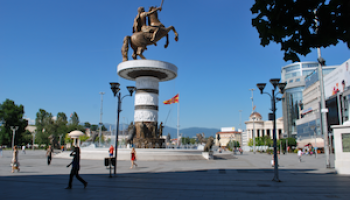Minutes before reaching the Lithuanian airspace on Sunday, Ryanair’s Boeing 737 was intercepted by a Soviet-era MIG which forced the passenger plane to make a series of maneuvers and turn towards Minsk, where agents entered the aircraft saying they were looking for a bomb.
No explosive device was found, but the grounding of the plane was used to arrest Roman Protasevich, a famous Belarusian activist and the former editor in chief of Nexta, a media outlet that shed light on Lukashenko’s crackdown on civil society after the 2020 presidential election.
Upon hearing about the diverted passenger plane, Belarusian activists, many of whom reside in neighboring Lithuania, alerted the public about the risk of Lukashenko’s government potentially using a fake bomb alert to arrest the journalist.
Lithuania had granted Protasevich asylum after his home country accused him of terrorism. In Belarus, Nexta played a major role in protests after another victory by Lukashenko at the 2020 presidential election, considered to be fraudulent by Western democracies. The outlet was used to both inform the public and assist the protesters.
In October 2020, a Belarusian court ruled that Nexta was an ‘extremist’ channel and turned Protasevich into a wanted man in his country.
Passenger Marius Rutkauskas, who sat near Protasevich during the flight, told Lithuania’s national TV that the journalist panicked when he realized the plane was landing in Minsk.
“He said: in Belarus, the death penalty is waiting for me,” Rukauskas recalled.
Authorities in Minsk claim the flight was diverted “to the nearest airport,” although Vilnius was at that moment much closer than Minsk.
After a few hours on the ground, the flight was released and proceeded to Vilnius, but with six passengers less, including Protasevich and his girlfriend. According to media reports, the other four passengers were Russian citizens for which Ryanair CEO Michael O'Leary said could have been Russian agents. He called the forced diversion of the plane a "state-sponsored hijacking."
The incident sparked outrage across the continent, with Lithuanian President Gitanas Nauseda calling the incident an “act of state-sponsored terrorism,” while Foreign Minister Gabrielius Landsbergis promised on Twitter that “it will not go unpunished.”
Head of the European Commission Ursula von der Leyen urged Belarus to immediately release Protasevich and called for those responsible for the hijacking to be sanctioned.
Irish Foreign Affairs Minister Simon Coveney said that the EU needs to be united and respond strongly or Belarus will perceive it as weak.
“It is utterly unacceptable. This is an Irish airline with EU citizens on board, forced to land in Minsk, while travelling between EU cities,” he tweeted.
Lithuania launched on Monday a criminal investigation into the hijacking and decided that no flights that passed over Belarus can land on its territory. Latvia’s airBaltic announced the airline will avoid Belarusian airspace until further notice.
Poland’s former Minister of Foreign Affairs, and current MEP Radoslaw Sikorski suggested that Belarus’ Belavia airline should be banned from European airspace.
Protasevich’s arrest is seen as part of Lukashenko’s crackdown on independent media and political activists. Hundreds of people were detained during anti-government protests that followed the last election and in February, two reporters from Belsat TV, Katerina Andreyeva and Daria Chultsova, have been sent to jail for ‘incitement’. The two were sentenced to two years in prison each for filming the anti-Lukashenko protests.






